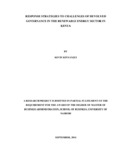| dc.contributor.author | Kinyanjui, Kevin | |
| dc.date.accessioned | 2014-11-18T09:44:51Z | |
| dc.date.available | 2014-11-18T09:44:51Z | |
| dc.date.issued | 2014-09 | |
| dc.identifier.citation | Master of business administration, University of Nairobi 2014 | en_US |
| dc.identifier.uri | http://hdl.handle.net/11295/74960 | |
| dc.description.abstract | Businesses are currently operating in a highly dynamic environment because of increased
globalization and internationalization. In order to align themselves with the changes in
the operating environment, it is important that they re-strategize.The objectives of the
study were to determine the challenges of devolved governance in the renewable energy
sector in Kenya and to establish the response strategies to the challenges of devolved
governance in the renewable energy sector in Kenya. This study adopted a cross-sectional
survey design. The population of the study comprised all 36 renewable energy sector
firms in Kenya. This study included all the firms in the study hence a census. This study
used primary data collected using a questionnaire. The study interviewed business
development officers in the renewable energy firms because of their involvement in
business development issues in their respective companies. The questionnaires collected
from the field were inspected for completeness and consistence then entered into
Statistical Package for Social Sciences for processing. The Likert scale type questions
were analyzed using mean scores and standard deviations. The open-ended questions
were analyzed qualitatively using content analysis and the results presented under
identified themes as per the objectives of the study. The study established that the
respondents were neutral on the county governments competing for prosperity. The study
established that there was weak institutional capacity at the devolved government level
thus devolved governance empowering the grassroots citizenry and decentralized
decision making was challenging. This study therefore recommends that government can
provide a smooth transition from a central government to county government to improve
decentralized governance structures. The study further concluded that the counties did not
have adequate financial resources to improve organizational operations. This study
therefore recommends that the stakeholders in the renewable energy industry as well as
the county management needs to come up with strategies that would enable effective
management of the available financial resources as well as strategies through which they
can generate additional funds for the management of the renewable energy sector. Further
the study recommends holding community education on the advantages of renewable
energy, offering free transportation for customers from the counties and establishing
branches at the county/sub-county level to improve decentralize government structures. | en_US |
| dc.language.iso | en | en_US |
| dc.title | Response strategies to challenges of devolved governance in the renewable energy sector in Kenya | en_US |
| dc.type | Thesis | en_US |
| dc.type.material | en_US | en_US |

